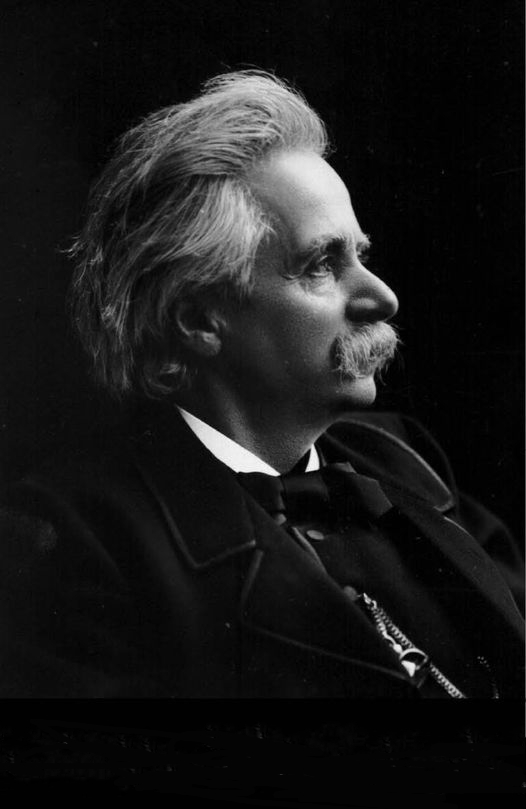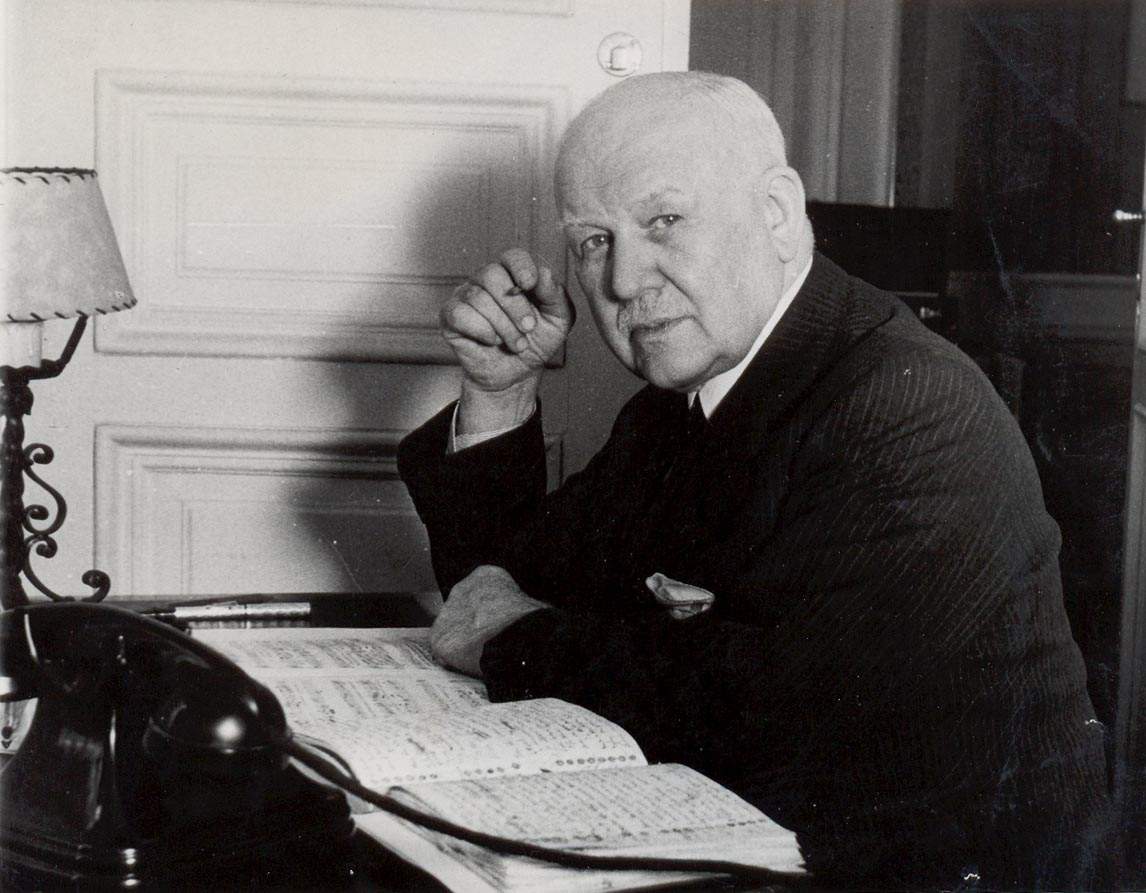
Deutsch-Chinesische Enzyklopädie, 德汉百科
 Musik der Romantik
Musik der Romantik

安东宁·利奥波德·德沃夏克(捷克语:Antonín Leopold Dvořák,1841年9月8日-1904年5月1日)生于布拉格(当时属于奥匈帝国,现属于捷克)附近的内拉霍奇夫斯镇伏尔塔瓦河旁的磨房内,卒于布拉格,是捷克民族乐派作曲家。
追随着民族主义者斯美塔那,德沃夏克经常在他的作品中使用摩拉维亚和他的故乡波希米亚(当时属于奥匈帝国,现属捷克)的民谣音乐的风格。德沃夏克自己的风格经常被描述为“吸收了民歌的影响并找到有效的方式利用它们,用交响乐的传统最完满的再现了一个民族的特色”。[1]其代表作有第九交响曲《新世界交响曲》、《B小调大提琴协奏曲 (德沃夏克)》、《斯拉夫舞曲》、歌剧《露莎卡》。他被认为“可能是他那个时代最多面手的作曲家”。
Antonín Leopold Dvořák  anhören?/i [ˈantɔɲiːn ˈlɛɔpɔlt ˈdvɔr̝aːk], (* 8. September 1841 in Nelahozeves; † 1. Mai 1904 in Prag) war ein böhmischer Komponist der Romantik. Sein vielseitiges Werk umfasst neun Sinfonien und zahlreiche weitere Orchesterwerke, Opern, Vokalmusik, Kammermusik sowie Klavier- und Orgelstücke. Dvořák ist der weltweit meistgespielte tschechische Komponist.
anhören?/i [ˈantɔɲiːn ˈlɛɔpɔlt ˈdvɔr̝aːk], (* 8. September 1841 in Nelahozeves; † 1. Mai 1904 in Prag) war ein böhmischer Komponist der Romantik. Sein vielseitiges Werk umfasst neun Sinfonien und zahlreiche weitere Orchesterwerke, Opern, Vokalmusik, Kammermusik sowie Klavier- und Orgelstücke. Dvořák ist der weltweit meistgespielte tschechische Komponist.
アントニーン・レオポルト・ドヴォルザーク(チェコ語:Antonín Leopold Dvořák [ˈantɔɲiːn ˈlɛɔpɔlt ˈdvɔr̝aːk]  発音[ヘルプ/ファイル]、1841年9月8日 - 1904年5月1日)は後期ロマン派におけるチェコの作曲家。チェコ国民楽派を代表する作曲家である。チェコ語の発音により近い「ドヴォルジャーク」[1]「ドヴォジャーク」[2]という表記も用いられている(表記についてはドヴォジャークを参照)。
発音[ヘルプ/ファイル]、1841年9月8日 - 1904年5月1日)は後期ロマン派におけるチェコの作曲家。チェコ国民楽派を代表する作曲家である。チェコ語の発音により近い「ドヴォルジャーク」[1]「ドヴォジャーク」[2]という表記も用いられている(表記についてはドヴォジャークを参照)。
ブラームスに才能を見いだされ、『スラヴ舞曲集』で一躍人気作曲家となった。スメタナとともにボヘミア楽派と呼ばれる。その後、アメリカに渡り、音楽院院長として音楽教育に貢献する傍ら、ネイティブ・アメリカンの音楽や黒人霊歌を吸収し、自身の作品に反映させている。代表作に、弦楽セレナード、管楽セレナード、ピアノ五重奏曲第2番、交響曲第7番、交響曲第8番、交響曲第9番『新世界より』、スラヴ舞曲集、この分野の代表作でもあるチェロ協奏曲、『アメリカ』の愛称で知られる弦楽四重奏曲第12番などがある。
Antonín Leopold Dvořák (/d(ə)ˈvɔːrʒɑːk, -ʒæk/ d(ə-)VOR-zha(h)k; Czech: [ˈantoɲiːn ˈlɛopold ˈdvor̝aːk] ( listen); 8 September 1841 – 1 May 1904) was a Czech composer, one of the first to achieve worldwide recognition. Following the Romantic-era nationalist example of his predecessor Bedřich Smetana, Dvořák frequently employed rhythms and other aspects of the folk music of Moravia and his native Bohemia. Dvořák's own style has been described as "the fullest recreation of a national idiom with that of the symphonic tradition, absorbing folk influences and finding effective ways of using them".[1]
listen); 8 September 1841 – 1 May 1904) was a Czech composer, one of the first to achieve worldwide recognition. Following the Romantic-era nationalist example of his predecessor Bedřich Smetana, Dvořák frequently employed rhythms and other aspects of the folk music of Moravia and his native Bohemia. Dvořák's own style has been described as "the fullest recreation of a national idiom with that of the symphonic tradition, absorbing folk influences and finding effective ways of using them".[1]
Dvořák displayed his musical gifts at an early age, being an apt violin student from age six. The first public performances of his works were in Prague in 1872 and, with special success, in 1873, when he was 31 years old. Seeking recognition beyond the Prague area, he submitted a score of his First Symphony to a prize competition in Germany, but did not win, and the unreturned manuscript was lost until rediscovered many decades later. In 1874 he made a submission to the Austrian State Prize for Composition, including scores of two further symphonies and other works. Although Dvořák was not aware of it, Johannes Brahms was the leading member of the jury and was highly impressed. The prize was awarded to Dvořák in 1874[a] and again in 1876 and in 1877, when Brahms and the prominent critic Eduard Hanslick, also a member of the jury, made themselves known to him. Brahms recommended Dvořák to his publisher, Simrock, who soon afterward commissioned what became the Slavonic Dances, Op. 46. These were highly praised by the Berlin music critic Louis Ehlert in 1878, the sheet music (of the original piano 4-hands version) had excellent sales, and Dvořák's international reputation was launched at last.
Dvořák's first piece of a religious nature, his setting of Stabat Mater, was premiered in Prague in 1880. It was very successfully performed in London in 1883, leading to many other performances in the United Kingdom and United States.[2] In his career, Dvořák made nine invited visits to England, often conducting performances of his own works. His Seventh Symphony was written for London. Visiting Russia in March 1890, he conducted concerts of his own music in Moscow and Saint Petersburg.[3] In 1891 Dvořák was appointed as a professor at the Prague Conservatory. In 1890–91, he wrote his Dumky Trio, one of his most successful chamber music pieces.
In 1892, Dvořák moved to the United States and became the director of the National Conservatory of Music of America in New York City. The President of the National Conservatory of Music in America, Jeannette Thurber, offered Dvořák an annual salary of $15,000– twenty-five times what he was paid at the Prague Conservatory.[4] While in the United States, Dvořák wrote his two most successful orchestral works: the Symphony From the New World, which spread his reputation worldwide,[5] and his Cello Concerto, one of the most highly regarded of all cello concerti. In the summer of 1893, Dvořák moved from New York City to Spillville, Iowa, following the advice of his secretary, J.J. Kovarík. Dvořák had originally planned to come back to Bohemia, but Spillville was made up of mostly Czech immigrants, and thus felt less homesick; Dvořák referred to it as his "summer Vysoka."[6] This is where he wrote his most famous piece of chamber music, his String Quartet in F major, Op. 96, which was later nicknamed the American Quartet. Shortly after his time in Iowa, Dvorák extended his contract at the National Conservatory for another two years. However, the economic crisis of April 1893 resulted in Thurber's husband's loss of income, and directly influenced the National Conservatory's funding. But shortfalls in payment of his salary, along with increasing recognition in Europe and an onset of homesickness, led him to leave the United States and return to Bohemia in 1895.
All of Dvořák's nine operas, except his first, have librettos in Czech and were intended to convey the Czech national spirit, as were some of his choral works. By far the most successful of the operas is Rusalka. Among his smaller works, the seventh Humoresque and the song "Songs My Mother Taught Me" are also widely performed and recorded. He has been described as "arguably the most versatile... composer of his time".[7]
The Dvořák Prague International Music Festival is a major series of concerts held annually to celebrate Dvořák's life and works.[8]
Antonín Dvořák (prononcé en tchèque : /ˈantɔɲiːn ˈdvɔr̝aːk/ Écouter), né le 8 septembre 1841 à Nelahozeves (royaume de Bohême) et mort le 1er mai 1904 à Prague, est un compositeur bohémien. Il est notamment l'auteur de la Symphonie du Nouveau Monde.
Antonín Leopold Dvořák (ascolta[?·info]; Nelahozeves, 8 settembre 1841 – Praga, 1º maggio 1904) è stato un compositore ceco.
Antonín Leopold Dvořák (/d(ə)ˈvɔːrʒɑːk, -ʒæk/ [ˈantoɲiːn ˈlɛopolt ˈdvor̝aːk] Nelahozeves, 8 de septiembre de 1841-Praga, 1 de mayo de 1904) fue un compositor posromántico natural de Bohemia —territorio entonces perteneciente al Imperio austríaco—. Es considerado el principal representante del nacionalismo checo en la música. Está considerado como uno de los grandes compositores de la segunda mitad del siglo XIX. Sin perder una amplia proyección internacional, supo extraer las esencias de la música de su tierra natal. Su obra más célebre es la Sinfonía del Nuevo Mundo.
Антони́н Двόржак (чеш. Antonín Leopold Dvořák (инф.); 8 сентября 1841 года — 1 мая 1904 года) — чешский композитор, представитель романтизма. В его произведениях широко используются мотивы и элементы народной музыки Моравии и Богемии. Вместе с Б. Сметаной является создателем чешской национальной музыкальной школы. К числу наиболее известных работ Дворжака относятся Симфония № 9 «Из Нового света» (написанная в США), опера «Русалка», Концерт для виолончели с оркестром, «Американский» струнный квартет, Реквием, Stabat Mater и «Славянские танцы».

夏尔-弗朗索瓦·古诺(法语:Charles-François Gounod,1818年6月17日-1893年10月17日),法国作曲家,代表作是歌剧《浮士德》。
古诺出生于巴黎,母亲是一位钢琴师,父亲是一位画家。很早就显露出音乐天赋。1836年进入巴黎音乐学院(Conservatoire de Paris),师从佛芒特·阿莱维。1839年以清唱剧“费迪南德”获得罗马大奖第1名。随后他获得公费到意大利深造的机会,研究帕勒斯特里那等宗教音乐。1842年回国路上他接触到德奥众多名家和作品,包括门德尔松,深受影响。在巴黎,他先后担任多个乐团和合唱团的管风琴师和指挥。
1851年古诺创作了第一部歌剧《萨福》,但是反响平平。1852年的第2部歌剧《残酷的修女》,也遭到失败。1859年根据歌德作品改编而成的歌剧《浮士德》取得极大成功,因为曲调通俗,色彩丰富,抒情柔美,开创了一代新风,奠定了他世界性的地位。此外,他的著名歌剧作品还有根据莎士比亚作品改编的《罗密欧与朱丽叶》(1867年)。
古诺是虔诚的教徒,因此创作了大量宗教题材作品,他华丽而质朴的风格在宗教音乐中也独树一帜。主要代表作包括脍炙人口的《圣母颂》(在巴赫作品基础上增写的旋律)、《圣塞西勒庆典弥撒曲》、梵蒂冈的国歌《教皇进行曲》等。

Clara Josephine Schumann geb. Wieck (* 13. September 1819 in Leipzig; † 20. Mai 1896 in Frankfurt am Main) war eine deutsche Pianistin, Komponistin, Klavierpädagogin und Herausgeberin. Sie war von 1840 bis zu dessen Tod 1856 die Ehefrau Robert Schumanns.
克拉拉·约瑟菲娜·舒曼(德語:Clara Josephine Schumann,1819年9月13日—1896年5月20日),原姓维克(德語:Wieck),德国钢琴家、作曲家及钢琴教师。丈夫罗伯特·舒曼亦为浪漫主义时期重要音乐家。她长达61年的巡演经历为其奠定乐坛地位,同时也间接推动钢琴音乐会曲目转型,使得更多严肃作品取代以往的炫技曲。其作品有《钢琴协奏曲》(作品7)以及一些钢琴独奏曲、室内乐作品、合唱曲、艺术歌曲。

Dmitri Dmitrijewitsch Schostakowitsch (russisch Дми́трий Дми́триевич Шостако́вичⓘ/?, wissenschaftliche Transliteration Dmitrij Dmitrievič Šostakovič; * 12. Septemberjul. / 25. September 1906greg. in Sankt Petersburg; † 9. August 1975 in Moskau) war ein russischer Komponist, Pianist und Pädagoge der Sowjetzeit. Neben 15 Sinfonien, Instrumentalkonzerten, Bühnenwerken und Filmmusik komponierte er 15 Streichquartette, die zu den Hauptwerken des Kammermusikrepertoires aus dem 20. Jahrhundert zählen.
德米特里·德米特里耶维奇·肖斯塔科维奇(俄语:Дмитрий Дмитриевич Шостакович,罗马化:Dmitriy Dmitrievich Shostakovich,发音:[ˈdmʲitrʲɪj ˈdmʲitrʲɪ(ɪ̯)ɪvʲɪt͡ɕ ʂəstɐˈkovʲɪt͡ɕ];1906年9月25日—1975年8月9日),前苏联时期俄国作曲家。他一生大部分时间都留在苏联,但同时也是当年少数名气能传至西方世界的作曲家,被誉为是二十世纪其中一位最重要的作曲家。
 Edvard Hagerup Grieg
Edvard Hagerup Grieg

 Music
Music

 Music
Music
 *Development of music
*Development of music

 Music
Music
 Gesang
Gesang

 Music
Music
 *Art Songs
*Art Songs
 Musik der Romantik
Musik der Romantik

Edvard Hagerup Grieg [ˈɛdʋɑɖ ˈhɑːgəɾʉp ˈgɾɪg] (* 15. Juni 1843 in Bergen, Norwegen; † 4. September 1907 ebenda) war ein norwegischer Pianist und Komponist der Romantik.
爱德华·哈盖鲁普·格里格(挪威语:Edvard Hagerup Grieg,1843年6月15日—1907年9月4日),挪威作曲家,浪漫主义音乐时期的重要作曲家之一。
爱德华·格里格出生于卑尔根,祖先是苏格兰人,具有民族主义、爱国主义思想倾向,作品大多以风俗生活、北欧民间传说、文学著作或自然景物为题材,具有鲜明的民族风格,是挪威民族乐派的人物。代表作有《A小调钢琴协奏曲》、《培尔·金特组曲》、《霍尔堡组曲》、《钢琴抒情组曲》等等。
挪威作曲家。19世纪下半叶挪威民族乐派代表人物。1843年6月15日生于卑尔根的商人家庭,1907年9月4日卒于 同地。6岁随母学钢琴,得到音乐启蒙教育。经著名小提琴家O.布尔推荐,1858一1862年在莱比锡音乐学院学习。毕业后,在卑尔根举行首次作品音乐 会。1863一1866年在丹麦首都哥本哈根活动,与挪威民族音乐的倡导者、音乐家R.诺克拉等人共创“尤特皮”音乐社,创作并介绍斯堪的纳维亚国家的民 族音乐。回国后,为建立挪威民族乐派积极展开音乐活动。1871年创立克里斯蒂安尼亚(今挪威首都奥斯陆)音乐协会,曾任该协会爱乐乐团和卑尔根“和谐” 合唱团指挥,并多次到英、法、德、意等国举行作品音乐会。1874年被政府授予终身年俸,1890年被选为法兰西艺术院院士,曾先后获英国剑桥大学和牛律 大学授予的音乐名誉博士衔。逝世时,挪威政府为他举行了国葬。(Quelle:http://www.for68.com/new/2006/9/wa73048627192960023256-0.htm)

Franz Lehár (* 30. April 1870 in Komorn, Österreich-Ungarn (heute: Komárno, Slowakei); † 24. Oktober 1948 in Bad Ischl, Österreich) war ein österreichischer Komponist. Lehár gilt zusammen mit Oscar Straus, Emmerich Kálmán und Leo Fall als Begründer und Hauptvertreter der sogenannten Silbernen Operettenära.
弗朗兹·莱哈尔(德語:Franz Lehár,1870年4月30日—1948年10月24日)是一位匈牙利血统的奥地利作曲家。匈牙利名为Lehár Ferenc。莱哈尔曾在布拉格音乐学院学习,在德沃夏克鼓励下开始作曲。他的音乐生涯始于军队乐队长,后来才在定居地维也纳投入其轻歌剧创作生涯。




